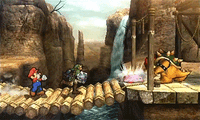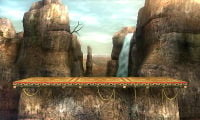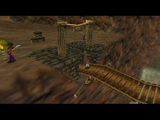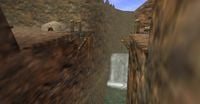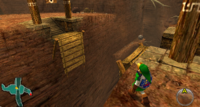Gerudo Valley: Difference between revisions
Ponyshment (talk | contribs) mNo edit summary |
mNo edit summary |
||
| Line 5: | Line 5: | ||
|name = Gerudo Valley | |name = Gerudo Valley | ||
|image = [[File:Gerudovalley3ds.png|250px]] | |image = [[File:Gerudovalley3ds.png|250px]] | ||
|caption = [[File:ZeldaSymbol.svg|50px]] | |caption = Gerudo Valley in {{for3ds}}.<br>[[File:ZeldaSymbol.svg|50px]] | ||
|universe = ''{{Uv|The Legend of Zelda}}'' | |universe = ''{{Uv|The Legend of Zelda}}'' | ||
|games = ''[[SSB4]]'' ([[SSB3DS|3DS]])<br/>''[[Ultimate]]'' | |games = ''[[SSB4]]'' ([[SSB3DS|3DS]])<br/>''[[Ultimate]]'' | ||
Revision as of 10:10, July 1, 2018
| Gerudo Valley | |
|---|---|
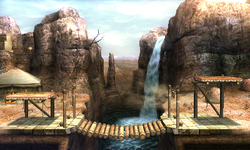 Gerudo Valley in Super Smash Bros. for Nintendo 3DS. 
| |
| Universe | The Legend of Zelda |
| Appears in | SSB4 (3DS) Ultimate |
| Availability | Starter |
| Crate type | Normal |
| Tracks available | Gerudo Valley Ocarina of Time Medley (Alternate) |
| Article on Zelda Wiki | Gerudo Valley |
Gerudo Valley[1] (ゲルドの谷, Gerudo Valley) is a stage in Super Smash Bros. for Nintendo 3DS and Super Smash Bros. Ultimate. It is one of two stages from the Zelda universe in Super Smash Bros. for Nintendo 3DS, alongside Spirit Train. This is where Ganondorf is unlocked.
Layout
The Gerudo Valley stage is a mostly flat, grounded stage. The stone and natural flooring serve as solid platforms, and a bridge crosses the chasm between the two stretches of land. Two canopies stand on each piece of land, providing soft platforms featuring the Gerudo symbol for characters to stand on.
The central bridge can be destroyed by attacking it, similarly to the floor of Green Hill Zone: this allows access to the chasm below, and makes the bottom blast line move downwards to compensate. Two small platforms, which can also be broken by attacks, protrude from each side of the chasm, as well as some damaging spikes which disappear when hit and do flame damage.
Soon after the bridge is broken, Koume and Kotake fly down laughing, and one of them casts a spell which alters one half of the stage: Koume's spell hits the left side of the stage covering it in damaging flames, while Kotake's spell hits the right side making freezing ice spikes appear.
After a while, the "Song of Time" will be heard and the bridge will repair itself: this returns the blast line back to its default position, KO'ing any fighters who do not return to the surface quickly enough. In earlier versions of the game the blast line moved rather abruptly, KO'ing fighters almost instantly as a result: this has been changed in Version 1.0.5, and players are now given a bit more time to recover before the camera returns to the default position.
The background of the stage features a waterfall, the Carpenters' tent and, behind the mountains in the left side, Gerudo's Fortress and the Horseback Archery Range. A desert wind will blow across the stage, for aesthetic effect.
Ω Form
In Omega mode, the stage has the Gerudo symbol as the floor design of the single walled platform.
Origin
Gerudo Valley originates from The Legend of Zelda: Ocarina of Time: it is a long, deserted valley which acts as the gateway to the domain of the Gerudo, and Link has to traverse it in order to reach Gerudo's Fortress and the Haunted Wasteland. The visual design of the stage is more similar to the one of the Nintendo 3DS remake The Legend of Zelda: Ocarina of Time 3D.
In the original game, the Gerudos decided to destroy the bridge over Zora's River to prevent intruders from entering their land. Carpenters then set up a camp nearby and attempted to repair it, however they were captured by the Gerudos and held captive in their fortress. After Link infiltrates the fortress and rescues them all, the bridge is finally repaired.
The symbol on the platforms represents the Gerudo tribe. In the original Ocarina of Time it was different, but it was replaced with the current version in all subsequent games (including ports and remakes of Ocarina) due to its resemblance to the Islamic star and crescent.
- See also: Kotake and Koume.
Gallery
A clearer view of the lower part of the stage, with spikes visible.
References
